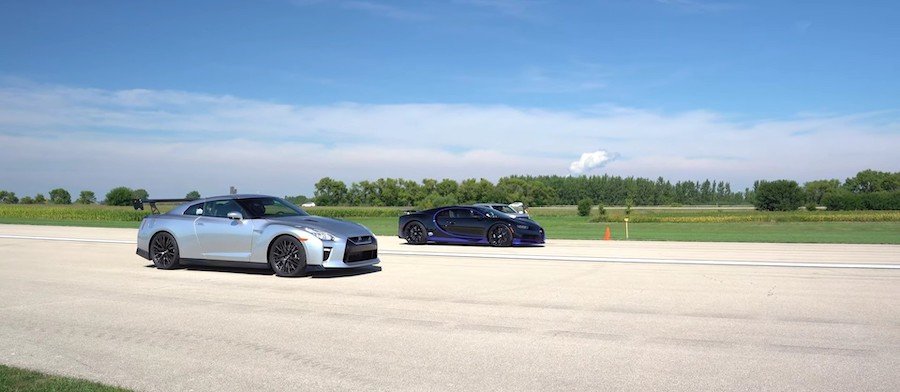2,000+ HP Nissan GT-R Drags Bugatti Chiron Just for the Fun of It, Sends It Home

Well, it’s a recipe for a monumental drag race event, courtesy of The Hamilton Collection. Seriously, all these cars are in one private collection, that of popular YouTuber Steve Hamilton. Every so often, he takes his multi-million-dollar automotive compilation down to an airfield, lines them up, puts some friends in the driver’s seats, and guns it.
You got the big idea by now – it’s one drag racing event this time, too, but with fast, faster, and very fast stock supersports. And a Nissan. The winner stays on track (literally) to the last race. Let’s meet the contenders and make some sense of the expensive enumeration opening this story.
First, a three-way drag race: the “Holy Trinity” – for Steve Hamilton – of supersports. A Porsche, a Ferrari (can’t race without the Prancing Horse), and a McLaren. In more detail, we’re looking at a 918 Spyder from the Germans, the aging LaFerrari from Italy, and the P1 of the British.
They are fast cars – but one of them has to be the fastest. Long story short – the Porsche beat them, with a time of 10.19 seconds across the quarter-mile mark. Not too far behind, the Ferrari came second, with a 10.30 time, just 0.07 seconds faster than the first McLaren of the day, which lost the drag with a 10.37 time.
While the 918 Spyder was the quickest off the line and hit 60 mph (96 kph) in just 2.89 seconds (against the 3.25 of the LaFerrari and the 3.27 of the P1), the Italian hypercar was the fastest across the opposite line, with the top speed of 144.04 mph (231.81 kph). The winner of the race was the last on the full-speed board, with just 142.80 mph (229.81 kph). The McLaren P1 scored a 143.75 mph (231.34 kph) result.
Good, not best, so the Porsche moved on to the next round – but until then, how about a McLaren-only sprint? The P1, a 765 LT, and the illustrious Senna (the McLaren Senna, that is) set the record straight once and for all (or just until next time).
The 765LT won – barely, but still – with the Senna hot on its tail and the P1 coming last. From top to bottom: 10.22-10.31-10.47, these are the famous quarter times. The Senna took advantage of its lightweight and accelerated better – but only from 60 mph (96 kph) onwards – and reached a max speed of 145.74 mph (234.54 kph). The 765LT maxed out at 144.54 mph (232.61 kph), and the P1 lost its pace compared to the first race – just 141.06 (227.01 kph). Maybe it took the “drag” part too seriously.
With the Brits out of business, the drag race became an all-German affair between the Porsche and the Volkswagen-owned Bugatti Chiron. This is a much more closely matched fight, and it could be anybody’s race at any given time, with both cars standing equal chances of taking an ego-boosting win.
This time, the Bugatti blitzed it with a 10.10-second run and a top speed of 154.40 mph (248.48 kph). At this point, it would be appropriate to throw some specs on the table: the 918 Spyder is a hybrid V8-dual electric motor with a combined output of 875 bhp and 944 lb-ft of torque (887 PS, 1280 Nm). It weighs 3,600 lbs (1,634 kg) and has AWD. What it doesn’t have is a turbo, and it could have used one.
Because the Chiron, with twice as many cylinders as the Porsche (sixteen of them), and nearly two times more power (1.479 bhp, 1,500 PS), is a formidable foe. Sure, it weighs a lot more than the 918 (4,400 lbs – a tad short of two tons), but it also has four turbos. Also, with all-wheel drive, the Chiron is no slug off the line.
However, the Porsche – benefitting from the electric torque – got off to a head start and gained a couple of lengths over the Bugatti. However, this time electricity alone couldn’t make up for lack of displacement, and the Porsche arrived a notch later than its rival.
Which went to the final round – against the Nissan. Right, at this moment, you know there is something way out of the ordinary, and you’re right. It’s the infamous GT-R 35, except it’s not in stock. Not anymore. It packs 2,150 bhp (2,180 PS), or the whereabouts of that amount.
The video is as self-explanatory as the Nissan itself – the Godzilla launched so violently that it carried a massive front-end lift for a good portion of the 8.94-second run. By the time it reached the finish line, it was doing 175 mph (281.6 kph).
Nouvelles connexes


